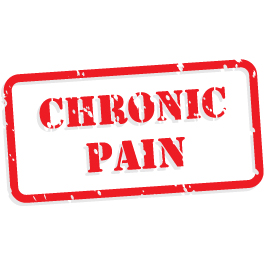Causes of Chronic Pain
 Just about everyone experiences pain at some point in their lives, but it’s when that pain lasts longer than several months that it becomes chronic pain. Unfortunately, the source of chronic pain isn’t always evident, which can lead to continued discomfort and frustration for an indefinite period of time.
Just about everyone experiences pain at some point in their lives, but it’s when that pain lasts longer than several months that it becomes chronic pain. Unfortunately, the source of chronic pain isn’t always evident, which can lead to continued discomfort and frustration for an indefinite period of time.
What Causes Pain?
Pain is the neurological sensation we experience when the nervous system is alerted to some form of injury, threat or discomfort. Pain generates from a specific area of the body, but the exact source of pain can be difficult to pinpoint because the sensation of pain is often felt some distance from the origin. This is called referred pain.
In the United States, more than 50 million Americans struggle with some form of chronic pain. There are several factors that increase your risk of developing chronic pain:
- Obesity
- Increased age
- Poor posture
- Work stress, such as carrying heavy objects
- Poor sleeping habits
There are three primary categories that explain the leading causes of chronic pain. They are:
Traumatic Factors
This includes any physical injury or trauma that led to the onset of pain. This would include situations like a sports injury or car accident that led to a severe injury that did not heal properly.
Examples of pain in this category include:
- Muscle and ligament tears, sprains and strains
- Broken bones
- Slipped vertebrae or other spine injury
- Burns
Medical or Genetic Factors
Pain can be the result of a congenital condition, in which case the pain will be present throughout most of your life until a suitable treatment method is found. Pain may also develop at any point in life as a result of chronic disease. Your risk for developing this form of pain may be increased if you are overweight.
Examples of medical causes of pain include:
- Autoimmune diseases like Crohn’s disease
- Heart disease
- Cancer
- Migraine headaches
- Osteoarthritis
- Fibromyalgia
- Multiple sclerosis
- Neuropathy
- Shingles
Osteoarthritis, a condition marked by the swelling of the joints from prolonged overuse, is among the most common causes of chronic pain in the United States, especially among older adults. Mental health conditions, like depression and severe anxiety, can also lead to chronic pain.
Lifestyle or Environmental Factors
The way you live your life can influence your risk for developing chronic pain. Poor sleeping habits, being inactive and being overweight or obese are all factors that can contribute to the onset of pain.
Pain management along with changes in lifestyle may help to reduce the severity of chronic pain. Adopting a healthy diet, engaging in low-intensity activity, and improving your sleeping habits are examples of lifestyle strategies often used in overcoming chronic pain.


